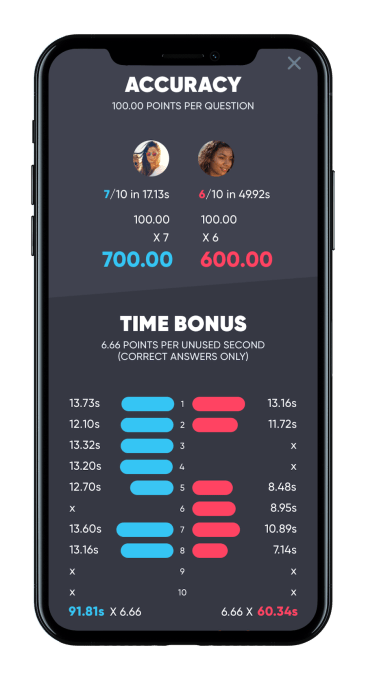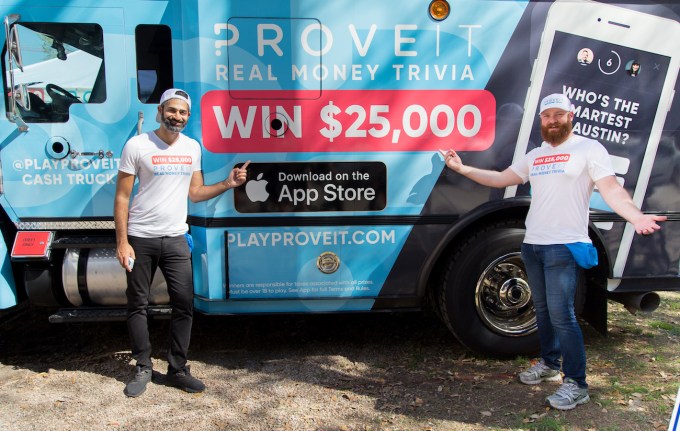
Pick a category, wager a few dollars and double your money in 60 seconds if you’re smarter and faster than your opponent. Proveit offers a fresh take on trivia and game show apps by letting you win or lose cash on quick 10-question, multiple choice quizzes. Sick of waiting to battle a million people on HQ for a chance at a fraction of the jackpot? Play one-on-one anytime you want or enter into scheduled tournaments with $1,000 or more in prize money, while Proveit takes around 10 percent to 15 percent of the stakes.
“I’d play Jeopardy all the time with my family and wondered ‘why can’t I do this for money?’ ” says co-founder Prem Thomas.
Remarkably, it’s all legal. The Proveit team spent two years getting approved as “skill-based gaming” that exempts it from some laws that have hindered fantasy sports betting apps. And for those at risk of addiction, Proveit offers players and their loved ones a way to cut them off.
The scrappy Florida-based startup has raised $2.3 million so far. With fun games and a snackable format, Proveit lets you enjoy the thrill of betting at a moment’s notice. That could make it a favorite amongst players and investors in a world of mobile games without consequences.
“I could spend $50 for a three-hour experience in a movie theater, or I could spend $2 to enter a Proveit Movies tournament that gives me the opportunity to compete for several thousand dollars in prize money,” says co-founder Nathan Lehoux. “That could pay for a lot of movies tickets!”
Proving it as outsiders
St. Petersburg, Fla. isn’t exactly known as an innovation hub. But outside Tampa Bay, far from the distractions, copycatting and astronomical rent of Silicon Valley, the founders of Proveit built something different. “What if people could play trivia for money just like fantasy sports?” Thomas asked his friend Lehoux.
That’s the same pitch that got me interested when Lehoux tracked me down at TechCrunch’s SXSW party earlier this year. Lehoux is a jolly, outgoing fella who became interested in startups while managing some angel investments for a family office. Thomas had worked in banking and health before starting a yoga-inspired sandals brand. Neither had computer science backgrounds, and they’d raised just a $300,000 seed round from childhood friend Hilt Tatum who’d co-founded beleaguered real money gambling site Absolute Poker.
Yet when he Lehoux thrust the Proveit app into my hand, even on a clogged mobile network at SXSW, it ran smoothly and I immediately felt the adrenaline rush of matching wits for money. They’d initially outsourced development to an NYC firm that burned much of their initial $300,000 seed funding without delivering. Luckily, the Ukrainian they’d hired to help review that shop’s code helped them spin up a whole team there that built an impressive v1 of Proveit.
Meanwhile, the founders worked with a gaming lawyer to secure approvals in 33 states including California, New York, and Texas. “This is a highly regulated and highly controversial space due to all the negative press that fantasy sports drummed up,” says Lehoux. “We talked to 100 banks and processors before finding one who’d work with us.”

Proveit founders (from left): Nathan Lehoux, Prem Thomas
Proveit was finally legal for the three-fourths of the U.S. population, and had a regulatory moat to deter competitors. To raise launch capital, the duo tapped their Florida connections to find John Morgan, a high-profile lawyer and medical marijuana advocate, who footed a $2 million angel round. A team of grad students in Tampa Bay was assembled to concoct the trivia questions, while a third-party AI company assists with weeding out fraud.
Proveit launched early this year, but beyond a SXSW promotion, it has stayed under the radar as it tinkers with tournaments and retention tactics. The app has now reached 80,000 registered users, 6,000 multi-deposit hardcore loyalists and has paid out $750,000 total. But watching HQ trivia climb to more than 1 million players per game has proven a bigger market for Proveit.
Quiz for cash
“We’re actually fans of HQ. We play. We think they’ve revolutionized the game show,” Lehoux tells me. “What we want to do is provide something very different. With HQ, you can’t pick your category. You can’t pick the time you want to play. We want to offer a much more customized experience.”

To play Proveit, you download its iOS-only app and fund your account with a buy-in of $20 to $100, earning more bonus cash with bigger packages (no minors allowed). Then you play a practice round to get the hang of it — something HQ sorely lacks. Once you’re ready, you pick from a list of game categories, each with a fixed wager of about $1 to $5 to play (choose your own bet is in the works). You can test your knowledge of superheroes, the ’90s, quotes, current events, rock ‘n roll, Seinfeld, tech and a rotating selection of other topics.
In each Proveit game you get 10 questions, 1 at a time, with up to 15 seconds to answer each. Most games are head-to-head, with options to be matched with a stranger, or a friend via phone contacts. You score more for quick answers, discouraging cheating via Google, and get penalized for errors. At the end, your score is tallied up and compared to your opponent, with the winner keeping both player’s wagers minus Proveit’s cut. In a minute or so, you could lose $3 or win $5.28. Afterwards you can demand a rematch, go double-or-nothing, head back to the category list or cash out if you have more than $20.
 The speed element creates intense, white-knuckled urgency. You can get every question right and still lose if your opponent is faster. So instead of second-guessing until locking in your choice just before the buzzer like on HQ, where one error knocks you out, you race to convert your instincts into answers on Proveit. The near instant gratification of a win or humiliation of a defeat nudge you to play again rather than having to wait for tomorrow’s game.
The speed element creates intense, white-knuckled urgency. You can get every question right and still lose if your opponent is faster. So instead of second-guessing until locking in your choice just before the buzzer like on HQ, where one error knocks you out, you race to convert your instincts into answers on Proveit. The near instant gratification of a win or humiliation of a defeat nudge you to play again rather than having to wait for tomorrow’s game.
Proveit will have to compete with free apps like Trivia Crack, prize games like student loan repayer Givling and virtual currency-based Fleetwit, and the juggernaut HQ.
“The large tournaments are the big draw,” Lehoux believes. Instead of playing one-on-one, you can register and ante up for a scheduled tournament where you compete in a single round against hundreds of players for a grand prize. Right now, the players with the top 20 percent of scores win at least their entry fee back or more, with a few geniuses collecting the cash of the rest of the losers.
Just like how DraftKings and FanDuel built their user base with big jackpot tournaments, Proveit hopes to do the same… then get people playing little one-on-one games in-between as they wait for their coffee or commute home from work.
Gaming or gambling?
Thankfully, Proveit understands just how addictive it can be. The startup offers a “self-exclusion” option. “If you feel that you need to take greater control of your life as it relates to skill-gaming,” users can email it to say they shouldn’t play any more, and it will freeze or close their account. Family members and others can also request you be frozen if you share a bank account, they’re your dependant, they’re obligated for your debts or you owe unpaid child support.

“We want Proveit to be a fun, intelligent entertainment option for our players. It’s impossible for us to know who might have an issue with real-money gaming,” Lehoux tells me. “Every responsible real-money game provides this type of option for its users.
That isn’t necessarily enough to thwart addiction, because dopamine can turn people into dopes. Just because the outcome is determined by your answers rather than someone else’s touchdown pass doesn’t change that.
Skill-based betting from home could be much more ripe for abuse than having to drag yourself to a casino, while giving people an excuse that they’re not gambling on chance. Zynga’s titles like Farmville have been turning people into micro-transaction zombies for a decade, and you can’t even win money from them. Simultaneously, sharks could study up on a category and let Proveit’s random matching deliver them willing rookies to strip cash from all day. “This is actually one of the few forms of entertainment that rewards players financially for using their brain,” Lehoux defends.

With so much content to consume and consequence-free games to play, there’s an edgy appeal to the danger of Proveit and apps like it. Its moral stance hinges on how much autonomy you think adults should be afforded. From Coca-Cola to Harley-Davidson to Caesar’s Palace, society has allowed businesses to profit off questionably safe products that some enjoy.
For better and worse, Proveit is one of the most exciting mobile games I’ve ever played.
Be the first to comment